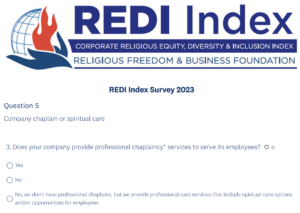As organizations seek to keep workforces healthy and productive, an area needing more attention – spiritual health
A new initiative from McKinsey & Co. identifies spiritual health as one of four interconnected components of overall health.
The McKinsey Health Institute’s report last month, The secret to great health? Escaping the healthcare matrix, found that healthcare systems focus almost entirely on physical health, with more than 90% money spent on healthcare going toward treating physical disease or physical symptoms. However, most people consider that mental, social, and spiritual health are as important as physical health and that they are deeply interconnected.
Significantly, McKinsey goes beyond the World Health Organization’s definition of health, which includes physical, mental and social, but not spiritual* health.
In a recent survey of 19,000 people across 19 countries, McKinsey reports that more than 8-in-10 people said that their mental health was as important to them as their physical health. Likewise, the majority also said that spiritual and social health were “extremely” or “very important” to them. And this was not a function of the socio-economic position of a country. These views were shared across high-, middle-, and low-income countries.
Indeed, as organizations seek to keep workforces healthy and productive, an area needing more attention is spiritual health.
In our Corporate Religious Equity, Diversity & Inclusion (REDI) Index, we include whether companies specifically provide for employees’ spiritual health either through corporate chaplains or some other means. Among companies competing the survey in 2022, the majority did. However, these companies self-selected into the benchmarking program, so we do not know what many other companies are doing in this area. We suspect not a lot.
To see more about the McKinsey Health Institute, click here. To read the full report, click here.



